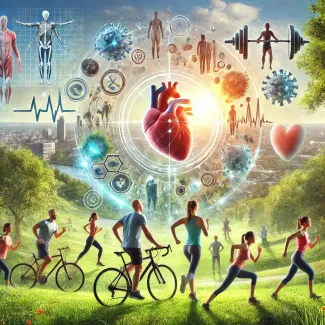
Regular exercise has long been recognized as a cornerstone of health and well-being, but its impact on longevity is particularly profound. As we age, maintaining an active lifestyle becomes not only important for physical fitness but also for enhancing the quality and duration of life. A growing body of scientific research highlights how exercise affects various aspects of health, contributing to increased life expectancy. From cardiovascular health to immune system function, muscle strength, flexibility, and sleep quality, regular physical activity plays a central role in preventing age-related decline and chronic diseases, thus ensuring long-term health.
1. Cardiovascular Health: A Foundation for Longevity
Cardiovascular health refers to the health of the heart and blood vessels, which is crucial for overall well-being. Regular exercise, particularly aerobic activities such as walking, cycling, swimming, and running, has been shown to significantly improve cardiovascular health. Numerous studies have confirmed that engaging in moderate to vigorous exercise reduces the risk of cardiovascular diseases, including heart attacks, stroke, and hypertension.
According to a 2019 study published in The Lancet, individuals who engage in regular physical activity reduce their risk of developing coronary artery disease by 30%, and the risk of stroke by 20%. Furthermore, exercise helps regulate cholesterol levels, lowering LDL (bad cholesterol) and increasing HDL (good cholesterol), which reduces the buildup of plaque in arteries and improves circulation.
Additionally, a study by the American Heart Association found that individuals who engage in at least 150 minutes of moderate-intensity aerobic exercise per week, or 75 minutes of vigorous-intensity activity, experience a substantial reduction in the risk of heart-related death. This underscores the vital role of exercise in maintaining cardiovascular health, which is a primary determinant of longevity.
2. Supports Muscle Strength and Flexibility: Critical as We Age
As we age, muscle mass naturally declines, a process known as sarcopenia. Without intervention, this leads to frailty, loss of mobility, and increased risk of falls and fractures. Resistance training, such as weightlifting, bodyweight exercises, and resistance band workouts, is critical in counteracting muscle loss. Additionally, flexibility exercises, including yoga and stretching, help maintain joint function and reduce stiffness.
A study published in the Journal of the American Geriatrics Society found that older adults who participated in strength training at least twice a week had 46% fewer falls compared to those who were inactive. Maintaining muscle strength and flexibility not only prevents injury but also ensures that older adults can continue performing daily activities independently, which greatly enhances their quality of life and overall longevity.
Furthermore, research published in Aging Research Reviews highlights that resistance training stimulates muscle protein synthesis and increases bone density, reducing the risk of osteoporosis. As we age, maintaining muscle strength and flexibility becomes more crucial for preserving independence and mobility, which are directly tied to longevity.
3. Boosts the Immune System: Protection Against Illness
The immune system plays a crucial role in protecting the body from infections and diseases. Aging weakens the immune response, a condition known as immunosenescence, which makes older individuals more susceptible to infections and chronic diseases. Regular exercise, however, can boost immune function by promoting the circulation of immune cells that identify and eliminate pathogens.
A review published in Frontiers in Immunology concluded that moderate-intensity exercise is associated with improved immune surveillance, enhancing the body’s ability to detect and respond to infections. In addition, exercise stimulates the production of anti-inflammatory cytokines, which helps to regulate inflammation in the body, a key factor in many age-related diseases such as arthritis, cardiovascular disease, and even cancer.
Another study in the British Journal of Sports Medicine found that individuals who exercised regularly were less likely to develop upper respiratory tract infections and recovered more quickly if they did get sick. The immune-boosting effects of regular physical activity thus play a significant role in longevity by reducing the risk of illness and enhancing overall health.
4. Improves Sleep Quality: Essential for Health and Well-being
Quality sleep is vital for physical and mental health. As we age, sleep patterns often become disrupted, leading to conditions such as insomnia, sleep apnea, and poor sleep quality, which negatively impact health. Regular exercise has been shown to improve sleep quality by regulating circadian rhythms and promoting deeper, more restorative sleep.
A study conducted by the National Sleep Foundation found that individuals who engage in regular physical activity fall asleep faster, sleep more soundly, and experience less daytime fatigue. The study also showed that exercise reduces the time it takes to fall asleep (sleep latency) and increases the duration of slow-wave sleep, which is critical for physical restoration and cognitive function.
Furthermore, a meta-analysis published in the Journal of Aging and Physical Activity confirmed that older adults who participate in regular exercise report fewer sleep disturbances and better overall sleep quality. By promoting better sleep, exercise helps prevent cognitive decline, depression, and other health conditions associated with poor sleep, thereby contributing to longevity.
5. Vital for Long-Term Health: Preventing Chronic Diseases
The relationship between regular exercise and the prevention of chronic diseases is well-established. Physical activity plays a key role in managing weight, reducing inflammation, improving insulin sensitivity, and promoting healthy blood pressure—all of which help prevent chronic diseases such as diabetes, obesity, cancer, and neurodegenerative disorders.
A landmark study published in The New England Journal of Medicine found that individuals who exercise regularly have a 30-50% reduced risk of developing type 2 diabetes, and a 20% lower risk of developing certain cancers, including breast and colon cancer. Exercise has also been linked to a reduced risk of Alzheimer’s disease and other forms of dementia. The Alzheimer's Association has stated that physical activity is one of the most promising lifestyle factors for reducing the risk of cognitive decline.
Regular exercise also helps mitigate the effects of metabolic syndrome, a cluster of conditions that increase the risk of heart disease, stroke, and diabetes. A study in Diabetes Care showed that individuals who followed a structured exercise regimen reduced their risk of developing metabolic syndrome by 35%.
Regular Exercise is Essential for Longevity
The benefits of regular exercise extend far beyond physical fitness; they are deeply intertwined with longevity and overall well-being. By promoting cardiovascular health, supporting muscle strength and flexibility, boosting the immune system, improving sleep quality, and preventing chronic diseases, exercise helps individuals maintain a high quality of life as they age. Scientific studies continue to affirm that staying active is one of the most effective ways to increase life expectancy and improve health outcomes across the lifespan.
Incorporating regular exercise into daily routines, regardless of age or fitness level, can lead to significant health improvements and a longer, healthier life. Whether through aerobic exercise, strength training, or flexibility exercises, the benefits are undeniable and contribute to a vital, active, and fulfilling life well into old age.






